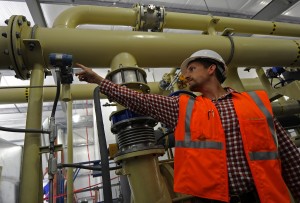Renewable Energy Jobs
Gas collection system technicians set up, manage, operate and control landfill gas collection system units and equipment to create renewable energy.
Gas collection system technicians set up, manage, operate and control landfill gas collection system units and equipment to create renewable energy.
Landfill gas (LFG) is generated when landfill waste decomposes. Landfill gas is composed of about 50% methane, the rest are carbon dioxide and small particles, all of which are extracted from the landfill via a well composed of many tubes. The methane gas is filtered out and can then be sent to a power plant, where it is burned to generate electricity and heat, turning methane into renewable energy resource. Methane gas generation systems technicians ensure the proper and efficient conversion of landfill gas to electricity and other forms of energy.
 Methane/landfill gas collection system technicians’ main responsibility is to operate landfill gas, methane, or natural gas-fueled electrical generation systems. They perform routine maintenance or minor repairs to landfill gas collection and power generation systems, including equipment such as pneumatic pumps, blower or flare systems, and condensate management systems. They also balance individual gas extraction wells at landfill gas facilities.
Methane/landfill gas collection system technicians’ main responsibility is to operate landfill gas, methane, or natural gas-fueled electrical generation systems. They perform routine maintenance or minor repairs to landfill gas collection and power generation systems, including equipment such as pneumatic pumps, blower or flare systems, and condensate management systems. They also balance individual gas extraction wells at landfill gas facilities.
On a daily basis, methane/landfill gas collection system technicians diagnose or troubleshoot problems with methane or landfill gas collection systems. They monitor landfill well fields periodically to ensure proper functioning and performance. They routinely download landfill gas well field monitoring data in order to perform monitoring activities. They measure landfill gas vegetative covering, and installing additional covering as required. They also measure liquid levels in landfill gas extraction wells.
Another important part of methane/landfill gas collection system technician’s job is to maintain safety and environmental rules and regulations. They routinely prepare and submit compliance, operational, and safety forms or reports. They read, interpret, and adjust monitoring equipment, such as flow meters and pressure or vacuum gauges. They record and maintain log of well-head gauge pressure readings. They verify to ensure that well field monitoring data conforms to applicable regulations.
Methane/landfill gas collection system technicians analyze the layout, instrumentation, or function of electrical generation or transmission facilities. They monitor landfill gas perimeter probes to identify landfill gas migration. They perform landfill surface scans to determine overall effectiveness of the landfill gas site. They repair or replace landfill gas piping if needed. They also trace electrical circuitry for landfill gas buildings to ensure compliance of electrical systems with applicable codes or laws.
To perform their job, methane/landfill gas collection system technicians use complex analyzers and instrumentation to support monitoring of plant operations and well fields, and are responsible for calibrating all of the instruments. They use tools such as combustible or hazardous gas detectors for power generators to monitor combustible gas. They use flowmeters to monitor gas passed through. They use oxygen gas analyzers to ensure the efficiency of the system. They collect and track data and use databases to store the data. For their analyses, they use analytical software such as Landfill gas analysis software or Landtec System Software LFG Pro.
Most methane/landfill gas collection system technicians work out of doors in all types of weather. They must be able to work in a noisy environment and extreme heat. While in the production area, they must follow established health and safety practices and wear the required protective clothing and equipment. They are often required to deal with hazardous materials. They are also required to work with equipment, and be able to lift heavy loads, crouch, bend, and kneel for extended periods of time. Methane/landfill gas collection system technicians work a standard 40-hour week but are required to be on call 24 hours, 7 days, on a rotating basis.
To obtain a green job as a methane/landfill gas collection system technician, it is usually required a combination of education, on-the-job training, and experience. An entry-level position as a methane gas generation systems technician requires at least a high school diploma. Candidates with a vocational school degree will have an advantage in finding a job, as well as more advancement opportunities. Employers prefer candidates with strong computer and technical skills. To advance in their career, one can obtain a Hazardous Waste Incinerator Certification from the American Society of Mechanical Engineers International. With production operation and management experience, one can advance to methane/landfill gas collection system operator.
The Bureau of Labor Statistics (BLS) indicates a bright outlook for methane/landfill gas collection system technicians and expects employment of this field to show little or no change from 2012 until 2022. However, the demand for methane/landfill gas collection system technicians is expected to go up. The BLS projected 4,500 methane/landfill gas collection system operator job openings between 2012 and 2022, and noted 12,000 jobs are currently filled. Titles include Gas Plant Technician, Gas Technician, Landfill Gas Collecting System Technician, Landfill Gas Collection System Technician, and Landfill Gas Generation System Technician. The BLS further reports that the median annual wage for salaried methane/landfill gas collection system technicians was $53,130 in 2012 with median hourly wage of $25.55. Across the US job market, the lowest 10% of methane/landfill gas collection system technicians earned about $30,220 a year, and the top 10% earned about $73,930 a year. Methane/landfill gas collection system technicians can receive the best compensation in Alaska, where they earn compensation, on average, of about $72,390. People in this job function are compensated at the highest average salary in Public Administration, where they get average pay levels of $63,880.